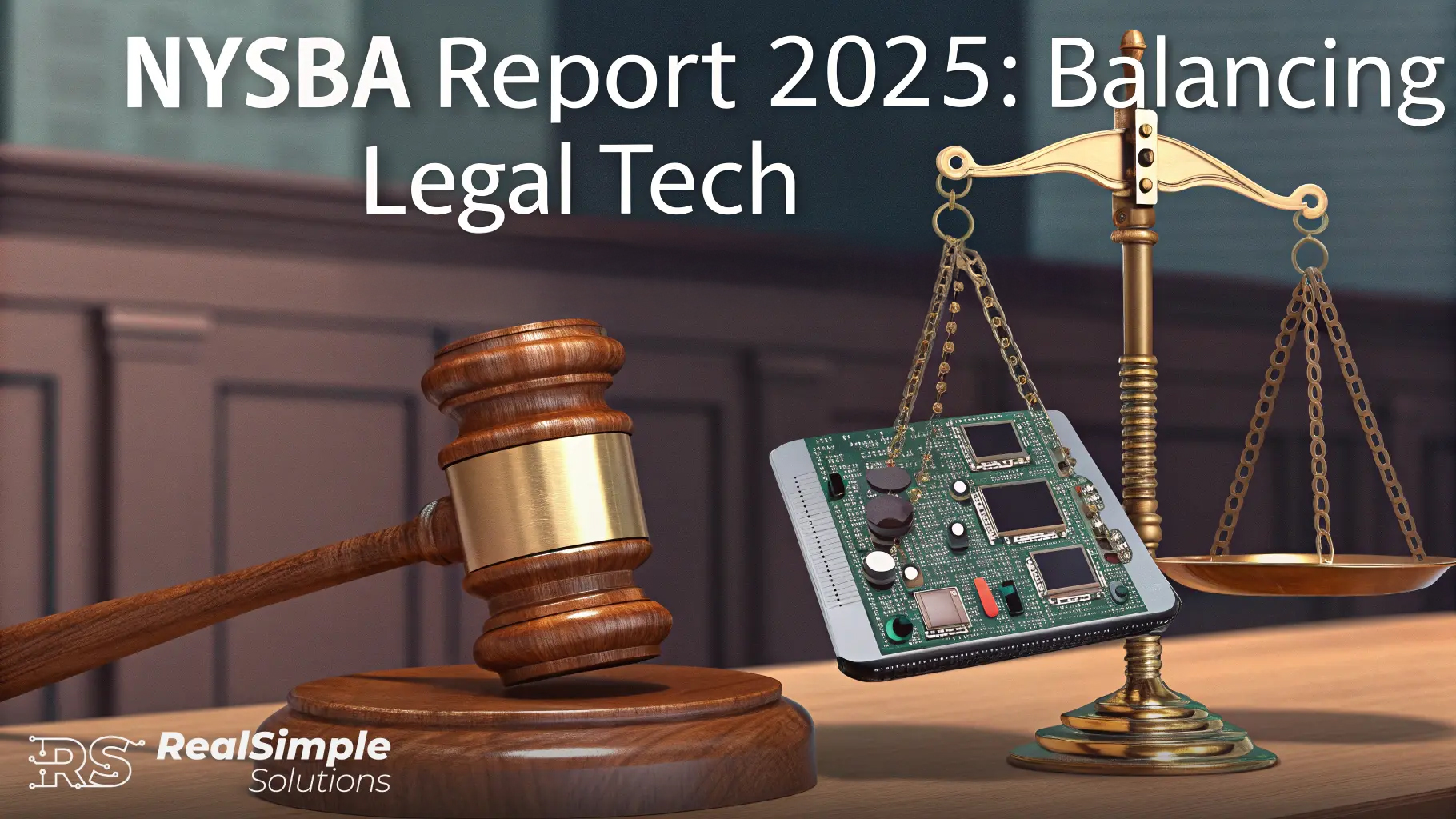NYSBA Report 2025: Balancing Legal Tech Competence While Avoiding Techno-Solutionism

NYSBA Report 2025: Balancing Legal Tech Competence While Avoiding Techno-Solutionism
Introduction
The legal profession stands at a technological crossroads in 2025. The New York State Bar Association (NYSBA) recently released a transformative report that delivers a thought-provoking but essential message. Legal professionals must adopt technological competence as a non-negotiable element of ethical practice while avoiding the trap of "techno-solutionism"—viewing technology as a panacea for all challenges.
This report explicitly states: "A refusal to use technology that makes legal work more accurate and efficient may be considered a refusal to provide competent representation." This bold declaration transforms the way attorneys approach their ethical responsibilities in the digital age. Below, we’ll unpack the key takeaways and explore practical steps for law firms and legal professionals to strike the perfect tech balance.
Understanding the NYSBA Report's Core Technology Mandates
What Does the Report Say?
The NYSBA’s report stresses this key message: using technology is not optional if it directly improves accuracy and efficiency in legal processes. Professionals who reject these tools put themselves at risk of violating competence and ethical standards. The report highlights several important findings:
- Referring to efficiency-enhancing tools as prerequisites for modern legal work.
- Emphasizing that a failure to adopt these tools could result in professional misconduct charges.
Building on Historical Context
The 2025 report builds upon prior ethics opinions, including ABA Model Rule 1.1, which introduced technology competence as part of ethical obligations back in 2012. However, the NYSBA takes a bold step further by examining specific instances and technologies shaped by recent advancements.
Essential Technologies
Technologies such as AI-based legal research platforms, document automation software, and electronic case management tools are cited as indispensable. Case studies illustrate situations where attorneys who refused these tools faced consequences like malpractice claims or lost cases.
Defining and Avoiding "Techno-Solutionism" in Legal Practice
What is Techno-Solutionism?
The report defines "techno-solutionism" as an over-reliance on technology to solve all issues, often ignoring the intricacies of human judgment and critical thinking. While digital tools are meant to enhance legal practice, they are not replacements for attorney expertise.
Understanding the Risks
Over-utilizing technology in uniquely complex scenarios can lead to:
- Misinterpretations of nuanced legal arguments.
- Over-dependence on machine-generated results.
- Risks in client confidentiality through oversights in data security.
A Balanced Approach
To prevent pitfalls, attorneys must:
- Use technology as an enhancement, not a replacement, of core skills.
- Validate results through professional judgment.
- Limit technology to tasks where it delivers measurable benefits, like research or routine case documentation.
Finding the Balance: Technology Adoption Best Practices
Framework for Staying Competent
Not every technology is suitable for your practice. Adopt tools that align with your firm’s size, specialization, and client needs. Here’s how:
- Evaluate ROI: Does the tool actually improve efficiency?
- Conduct Trials: Test technologies before a firm-wide implementation.
- Client-Centric Decisions: Choose options that improve service to clients.
Implementation Strategies
Rolling out technology effectively requires planning:
- Training: Educate attorneys and support staff.
- Integration: Ensure seamless compatibility with existing systems.
- Documentation: Maintain clear records showing compliance with competence requirements.
Developing Policies and Systems
Create a firm-wide policy detailing the use of technology in daily operations. This document should specify what tools are mandatory, timelines for adoption, and training expectations.
Ethical Implications of Technology Resistance in 2025
Competence and Zealous Representation
Failing to adopt efficiency-improving technology raises serious ethical questions. In today’s tech-driven landscape:
- Clients expect faster, more accurate representation.
- Attorneys refusing to use widely accepted technologies may breach their duty to provide competent service.
Avoiding Malpractice
The risks associated with technology resistance include:
- Claims of negligence by clients.
- Reduced competitiveness against tech-savvy peers.
Client Communication
Transparency is crucial. If a firm chooses not to adopt a specific technology, they must clearly explain this decision to clients and ensure that alternative methods achieve comparable outcomes.
The Future of Legal Technology After the NYSBA Report
Nationwide Impact
This report is expected to serve as a blueprint for bar associations across the nation, likely prompting similar requirements in other states.
Emerging Technologies
Technologies like AI-driven contract analyzers, predictive case-outcome analytics, and blockchain for secure transactions are poised to become integral requirements in legal practices.
Adapting Educational Curricula
Law schools have already begun reshaping their curricula, incorporating practical technology training to prepare future attorneys for ethical competence in the modern workforce.
Lifelong Learning
Practicing attorneys should anticipate new continuing education mandates focusing on emerging technologies and their ethical implications.
Conclusion
The NYSBA’s 2025 report delivers a compelling message: mastering legal technology is no longer aspirational—it’s essential. Competence requires integrating the right tools to ensure accuracy and efficiency, yet safeguarding human expertise from over-reliance on machines.
As legal professionals, this balance demands continuous learning, adaptive strategies, and thoughtful adoption. By understanding the nuances of the report and taking actionable steps now, you position yourself not only as a competitive attorney but also as an ethical standard-bearer.
Don’t get left behind. Start automating your practice today and pave the way toward a future where technological savviness meets timeless professional excellence.